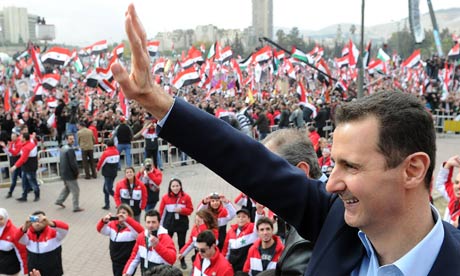As fighting in Syria grows fiercer and the death toll continues to mount, President Bashar al-Assad still enjoys support from parts of the Syrian population. We spoke to a number of people who continue to rally behind the embattled leader.

There’s no easy political solution to ending more than 17 months of conflict in Syria, a feat made complicated partly because of deep divisions within the international community. While Western countries have called for Assad to step down, Russia, China and Iran – which all back the Syrian regime – continue to advocate for negotiations between the Syrian government and opposition forces. More than 25,000 Syrians, the vast majority of whom are civilians, have been killed since the beginning of the conflict, according to the Syrian Observatory for Human Rights (SOHR), while a further two million have been forced to flee their homes.
In a report published on August 15, a panel appointed by the UN Human Rights Council found that there was enough evidence to believe that the Syrian government and pro-Assad forces had committed “crimes against humanity”. The report examined several incidents, including a May 25 Houla massacre, where 108 people – including 49 children – were slaughtered. Opposition forces have also been accused of war crimes, though not on the same scale as the Assad regime.
Because the Observers Team has repeatedly given opposition activists the opportunity to shed light on atrocities committed by government forces, we felt it was important to also give Assad’s supporters a chance to express their views.
“I prefer Assad to the jihadists”
Louaï, 40, is a film editor.
I support Bashar al-Assad because I am against the opposition. The only chance this country has of getting out of this crisis is if the opposition stops using violence and takes a seat at the negotiation table without any preconditions [the Syrian National Council, an opposition organisation, has said they will only enter negotiations if Assad quits power]. I am not opposed to a transfer of power, but it can’t happen without Assad. He is the only one capable of finding a solution.
Those who are fighting the regime did not take up arms to fight for democracy, they are simply trying to take over power. The Free Syrian Army is made up of jihadist Salafists, many of whom have come from abroad to wreak havoc in our country.
“I worry when I look at what is going on in countries that have recently had revolutions”
Personally, when I look at what is going on in countries where revolutions have spurred regime change, like in Tunisia where Salafists are now trying to impose their law through violence, I find the prospect of an opposition victory in Syria is worrisome.
Jaramana, where I live [about 10 kilometers or six miles outside the capital Damascus], was the calmest city in Syria until three days ago, when a car bomb exploded near a funeral convoy. Here, different communities – Christians, Sunnis, Alawites, Druze – have always lived in complete harmony. I am Shiitte, and my wife is Christian. Our peaceful coexistence, however, is now under threat. I doubt that the jihadists will adhere to democratic values and from attacking Syrians with different beliefs if they succeed in overthrowing the government.
“Assad has undertaken democratic reforms”
Nourane, 30, lives in Damascus.
We must not forget that Assad was responsible for launching democratic reforms. He abolished the state of emergency [in a bid to appease opposition factions, the government adopted a series of reforms in April 2011 that brought an end to the state of emergency, abolished the Supreme State Security Court and implemented a new constitution based on political pluralism (February 26, 2012)].
I voted democratically for his reelection [Assad was reelected president in May, 2007 with 97.62 percent of the vote. The election was widely believed to be fraudulent] and for the new constitution. Should the opposition really have the right to remove an elected president?
We cannot blame Assad for all of Syria’s problems. Mistakes are often made by local officials, as the president cannot be everywhere at once. Remember that the crisis started in March, 2011 in Deraa. Government forces had opened fire on protesters who were advocating the release of several teenagers that had been arrested for spray painting slogans of the Egyptian Revolution. That is what originally set things off. But we forget that the president dismissed and sanctioned the governor of Derra, Faisal Kalthoum, who was responsible for imprisoning the teenagers and opening fire on protesters. The president even made an effort to address the issue by meeting with Derra’s clan chiefs.
We are all against corruption and bureaucracy, and in favour of greater liberties in Syria. But we do not want these people, who are massacring the Syrian people in the name of freedom. The president has already tried to put in place exactly these kind of reforms [faced with mounting tensions, Assad announced in February of last year plans to reduce taxes, create 67,000 government jobs, and his intention to fire hundreds of civil servants accused of corruption].



No comments:
Post a Comment